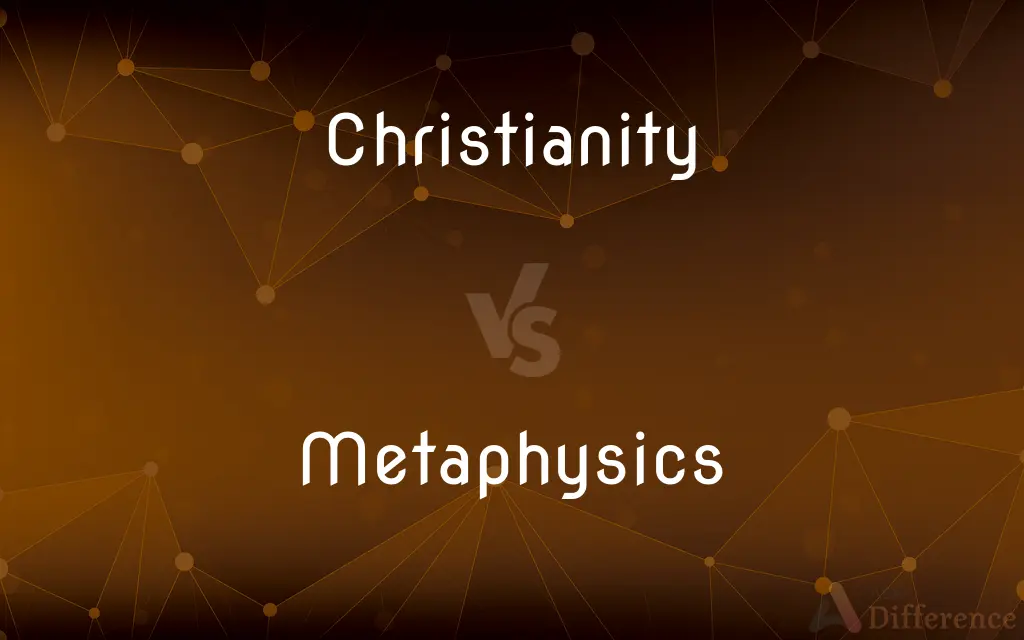Christianity vs. Metaphysics — What's the Difference?
By Maham Liaqat & Fiza Rafique — Updated on March 31, 2024
Christianity is a monotheistic religion centered on the teachings of Jesus Christ, focusing on faith and worship, whereas metaphysics explores the fundamental nature of reality and existence without reliance on religious doctrine.

Difference Between Christianity and Metaphysics
Table of Contents
ADVERTISEMENT
Key Differences
Christianity is based on the belief in one God and follows the teachings and life of Jesus Christ, emphasizing salvation through faith. It relies on scriptures such as the Bible for guidance and forming its doctrines. On the other hand, metaphysics is a branch of philosophy that delves into understanding the nature of being, existence, and the universe. It asks fundamental questions that may not be confined to religious beliefs.
Christianity engages its followers through practices like prayer, worship, and sacraments, aiming to foster a personal and communal relationship with God. These practices are seen as ways to receive grace and guidance. Whereas metaphysics, through its inquiry and philosophical methods, encourages contemplation and reasoning to explore concepts like reality, space, time, and causality, often without involving ritualistic or religious practices.
The moral and ethical teachings of Christianity are derived from the Bible and the example of Jesus Christ, offering a framework for behavior and social justice grounded in love and compassion. Metaphysics, while it may influence ethical considerations, primarily focuses on abstract principles and the underlying nature of morality rather than prescribing specific behaviors.
Christianity views the afterlife as a continuation of the soul's existence, with beliefs in heaven, hell, and sometimes purgatory, depending on the denomination. These views are closely tied to the moral life led by individuals. Metaphysics, however, might explore the concept of the afterlife in a broader sense, questioning the essence of the soul and its existence beyond physical death without committing to any religious doctrine.
Christianity has developed a rich tradition of theology, exploring the nature of God, the Trinity, and the mystery of salvation among other doctrines. This theological exploration is grounded in faith and revelation. Metaphysics, on the other hand, relies on logical analysis and philosophical argumentation, often considering similar themes but from a non-dogmatic and speculative perspective.
ADVERTISEMENT
Comparison Chart
Definition
A religion based on the life and teachings of Jesus Christ.
A branch of philosophy exploring the fundamental nature of reality.
Foundation
Based on faith and the Bible.
Based on philosophical inquiry and reasoning.
Practices
Prayer, worship, sacraments.
Philosophical contemplation and analysis.
Moral Teachings
Derived from the Bible and Jesus’s teachings.
Explored through abstract principles.
Afterlife Beliefs
Beliefs in heaven, hell, and purgatory.
Questions the essence of the soul and its existence.
Compare with Definitions
Christianity
Teaches about heaven, hell, and sometimes purgatory in the afterlife.
Christianity offers hope of heaven to believers who live righteously.
Metaphysics
Investigates concepts like being, time, space, and causality.
Metaphysics includes the study of causality and how events are interconnected.
Christianity
A monotheistic religion centered on Jesus Christ's teachings and life.
Christianity's core belief is in salvation through faith in Jesus.
Metaphysics
Utilizes logical analysis and argumentation.
Metaphysicians use rigorous reasoning to explore abstract concepts.
Christianity
Focuses on the worship of one God and follows the Bible as its holy scripture.
In Christianity, the Bible is considered the word of God.
Metaphysics
Influences ethical and moral considerations through abstract principles.
Metaphysics can challenge our understanding of what is morally right or wrong.
Christianity
Practices include prayer, sacraments, and community worship.
Christians gather every Sunday for worship as a community.
Metaphysics
A philosophical discipline exploring the nature of existence and reality.
Metaphysics questions the fundamental nature of reality beyond physical observation.
Christianity
Emphasizes love, compassion, and forgiveness as moral principles.
Christianity teaches to love your neighbor as yourself.
Metaphysics
Explores the possibility of an afterlife and the essence of the soul.
Metaphysics often delves into discussions about the soul's existence after death.
Christianity
Christianity is an Abrahamic monotheistic religion based on the life and teachings of Jesus of Nazareth. It is the world's largest religion, with about 2.4 billion followers.
Metaphysics
Metaphysics is the branch of philosophy that studies the first principles of being, identity and change, space and time, causality, necessity and possibility. It includes questions about the nature of consciousness and the relationship between mind and matter.
Christianity
A religion based on the life and teachings of Jesus. Most forms of Christianity hold that Jesus is the son of God and is the second person of the Trinity, through whom humans may attain redemption from sin.
Metaphysics
(used with a sing. verb) Philosophy The branch of philosophy that examines the nature of reality, including the relationship between mind and matter, substance and attribute, possibility and actuality.
Christianity
Christians as a group; Christendom.
Metaphysics
(used with a pl. verb) The theoretical or first principles of a particular discipline
The metaphysics of law.
Christianity
The state or fact of being a Christian.
Metaphysics
(used with a sing. verb) A priori speculation upon questions that are unanswerable to scientific observation, analysis, or experiment.
Christianity
Pl. Chris·ti·an·i·ties A particular form or sect of the Christian religion
The Christianities of antiquity.
Metaphysics
(used with a sing. verb) Excessively subtle or recondite reasoning.
Christianity
The religion of Christians; the system of doctrines and precepts taught by Christ.
Metaphysics
The branch of philosophy which studies fundamental principles intended to describe or explain all that is, and which are not themselves explained by anything more fundamental; the study of first principles; the study of being insofar as it is being (Latin: ens in quantum ens).
Philosophers sometimes say that metaphysics is the study of the ultimate nature of the universe.
Christianity
Practical conformity of one's inward and outward life to the spirit of the Christian religion
Metaphysics
The view or theory of a particular philosopher or school of thinkers concerning the first principles which describe or explain all that is.
The metaphysics of Thomas Aquinas holds that all real beings have both essence and existence.
In Aristotelian metaphysics physical objects have both form and matter.
In his Pensées, Pascal mentioned some first principles recognized within his metaphysics: space, time, motion, and number.
Christianity
The body of Christian believers.
To Walys fled the christianiteeOf olde Britons.
Metaphysics
The metalogic of physics; the logical framework of physics.
Even other universes should be a result of different physics. Without rules, these universes wouldn't exist, because they will have an undefined, thus impossible, nature. We will never understand or guess all possible forms of physics. That's why we have to understand the generic metaphysics.
Christianity
A monotheistic system of beliefs and practices based on the Old Testament and the teachings of Jesus as embodied in the New Testament and emphasizing the role of Jesus as savior
Metaphysics
Any fundamental principles or rules.
Christianity
The collective body of Christians throughout the world and history (found predominantly in Europe and the Americas and Australia);
For a thousand years the Roman Catholic Church was the principal church of Christendom
Metaphysics
(uncountable) The study of a supersensual realm or of phenomena which transcend the physical world.
I have a collection of books on metaphysics, covering astral projection, reincarnation, and communication with spirits.
Metaphysics
Displeasingly abstruse, complex material on any subject.
This political polemic strikes me as a protracted piece of overwrought, fog-shrouded metaphysics!
Metaphysics
Plural of metaphysic
Metaphysics
The science of real as distinguished from phenomenal being; ontology; also, the science of being, with reference to its abstract and universal conditions, as distinguished from the science of determined or concrete being; the science of the conceptions and relations which are necessarily implied as true of every kind of being; philosophy in general; first principles, or the science of first principles.
Commonly, in the schools, called metaphysics, as being part of the philosophy of Aristotle, which hath that for title; but it is in another sense: for there it signifieth as much as "books written or placed after his natural philosophy." But the schools take them for "books of supernatural philosophy;" for the word metaphysic will bear both these senses.
Now the science conversant about all such inferences of unknown being from its known manifestations, is called ontology, or metaphysics proper.
Metaphysics are [is] the science which determines what can and what can not be known of being, and the laws of being, a priori.
Metaphysics
The scientific knowledge of mental phenomena; mental philosophy; psychology.
Metaphysics, in whatever latitude the term be taken, is a science or complement of sciences exclusively occupied with mind.
Whether, after all,A larger metaphysics might not helpOur physics.
Metaphysics
The philosophical study of being and knowing
Common Curiosities
Can metaphysics and Christianity intersect?
Yes, metaphysics and Christianity can intersect, especially in discussions about the nature of existence, God, and the soul.
What does metaphysics study?
Metaphysics studies the fundamental nature of reality, including concepts like being, existence, and the universe.
How do Christians practice their faith?
Christians practice their faith through prayer, worship, and participating in sacraments.
Is metaphysics a part of religious studies?
While metaphysics can intersect with religious studies, it is a branch of philosophy focused on fundamental questions about reality that are not confined to any one religion.
What is the Christian belief about the afterlife?
Christianity believes in an afterlife, where souls go to heaven, hell, or purgatory based on their earthly lives.
How does metaphysics view the afterlife?
Metaphysics explores concepts of the afterlife and soul in a broader, more speculative sense, without adhering to specific religious doctrines.
Can one be a Christian and study metaphysics?
Yes, one can be a Christian and study metaphysics, as both can enrich an individual's understanding of existence and spirituality.
What is the main focus of Christianity?
Christianity focuses on the worship of one God and follows the teachings and life of Jesus Christ, emphasizing salvation through faith.
What methods do metaphysicians use?
Metaphysicians use philosophical inquiry, logical analysis, and argumentation.
What are the moral teachings of Christianity?
The moral teachings of Christianity are based on love, compassion, and forgiveness, as taught in the Bible.
Does metaphysics prescribe a way of living?
No, metaphysics does not prescribe a specific way of living but explores abstract principles that may influence ethical considerations.
How do the practices of Christianity and metaphysics differ?
Christianity's practices include rituals like prayer and worship, aimed at fostering a relationship with God, while metaphysical practice involves contemplation and philosophical analysis without ritualistic elements.
What is the source of Christian teachings?
The source of Christian teachings is the Bible, which includes the Old and New Testaments.
What role do ethics play in Christianity and metaphysics?
In Christianity, ethics are derived from scriptural teachings and the example of Jesus, while in metaphysics, ethical considerations arise from abstract principles and the nature of being.
How do Christianity and metaphysics differ in their exploration of God?
Christianity explores God through faith and scripture, whereas metaphysics might consider the concept of God philosophically, without religious dogma.
Share Your Discovery

Previous Comparison
Presbyter vs. Priest
Next Comparison
Chicken vs. LizardAuthor Spotlight
Written by
Maham LiaqatCo-written by
Fiza RafiqueFiza Rafique is a skilled content writer at AskDifference.com, where she meticulously refines and enhances written pieces. Drawing from her vast editorial expertise, Fiza ensures clarity, accuracy, and precision in every article. Passionate about language, she continually seeks to elevate the quality of content for readers worldwide.














































